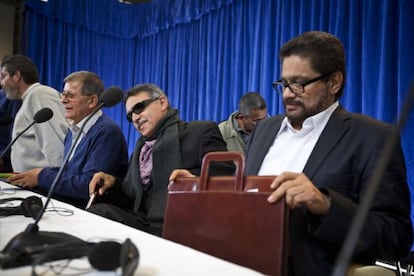No end to ambushes and arrests as FARC peace talks take place in Oslo
Five Colombian soldiers were killed just days after discussions officially began

One week after the Colombian government and members of the country's largest insurgency began their historic peace talks in Oslo, both sides are still refusing to call a truce as violent attacks, deaths and arrests continue unabated throughout the country.
Colombian officials and members of the Revolutionary Armed Forces of Colombia (FARC) are holding secret talks to discuss the framework on the issues that they hope to include in a final peace process. But both sides began their meeting on tense lines.
Humberto de la Calle, a former vice president and the government's chief negotiator, said that the FARC are committed to making reparations to all victims of their past 50-year insurgency, which must be done through "transitional legal mechanisms" that he did not detail.
The head of the FARC's main negotiating committee, Iván Márquez, the insurgency's top leader, reiterated his group's goodwill in the pursuit of a peace accord, but at the same time justified the decades-long armed struggle and blamed the current administration of Juan Manuel Santos for ongoing poverty and inequality in the country. His statement didn't go down well with the government's delegation.
Let's see if these talks produce any results," says President Santos
The FARC has come to the negotiating table badly demoralized. According to official figures, some 17,000 of its members have deserted the guerrilla organization over the past decade. The FARC, which once had about 30,000 members, now only has 9,000.
"Let's see if these talks produce any results," said President Juan Manuel Santos in Bogota. "We know exactly what we want; we know exactly which lines we can cross are which we cannot."
On Saturday, Colombian authorities reported that five soldiers were killed following a FARC ambush in Putumayo department as they were crossing a creek. Two other military officers were wounded in the attack. On the same day, the military said it had captured four FARC members with explosives and firearms in another area of the department. Twelve members of the insurgency group that had joined a band of criminals were also arrested on Tuesday in several departments.
On Tuesday, Catherine Ashton, the European Union's high representative for foreign affairs and security policy, called on the FARC to declare a ceasefire as these talks progress. In a statement, Ashton urged the FARC to "seize this moment to take responsibility and prove its sincerity by ceasing its attacks and violations of international humanitarian law."
Uribe said he could not accept offering guerrillas any type of amnesty
The Colombian-FARC peace talks were late in starting last week when several members, including Iván Márquez, whose real name is Luciano Marín Luango, requested and received guarantees that they would not be arrested on Interpol warrants. Nevertheless, the government of Paraguay said that it would not lift warrants against two members of the insurgency's delegation - Rodrigo Granda, alias "Ricardo Téllez," and Orlando Jurado Palomino, known as "Hermes Aguilar" - for their involvement in the 2004 kidnapping and death of the daughter of former Paraguayan President Raúl Cubas.
Besides the host nation Norway, Cuba, Venezuela and Chile are brokering the talks.
Former President Álvaro Uribe, one of Santos' most ardent critics, said he could not accept any terms that would offer the guerrillas an amnesty. "The Europeans don't understand this, but we cannot accept what happened in some Central American nations where the guerrillas were pardoned and they all got seats in Congress," Uribe said.
Tu suscripción se está usando en otro dispositivo
¿Quieres añadir otro usuario a tu suscripción?
Si continúas leyendo en este dispositivo, no se podrá leer en el otro.
FlechaTu suscripción se está usando en otro dispositivo y solo puedes acceder a EL PAÍS desde un dispositivo a la vez.
Si quieres compartir tu cuenta, cambia tu suscripción a la modalidad Premium, así podrás añadir otro usuario. Cada uno accederá con su propia cuenta de email, lo que os permitirá personalizar vuestra experiencia en EL PAÍS.
¿Tienes una suscripción de empresa? Accede aquí para contratar más cuentas.
En el caso de no saber quién está usando tu cuenta, te recomendamos cambiar tu contraseña aquí.
Si decides continuar compartiendo tu cuenta, este mensaje se mostrará en tu dispositivo y en el de la otra persona que está usando tu cuenta de forma indefinida, afectando a tu experiencia de lectura. Puedes consultar aquí los términos y condiciones de la suscripción digital.








































